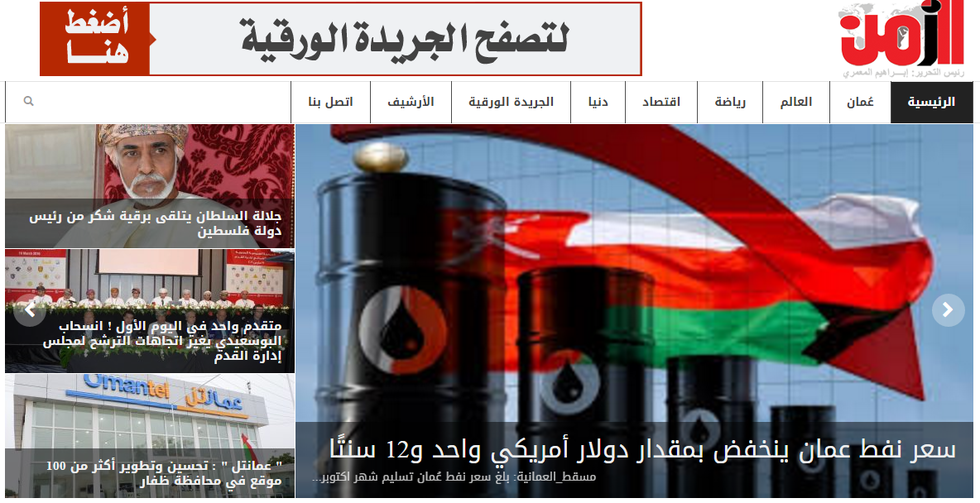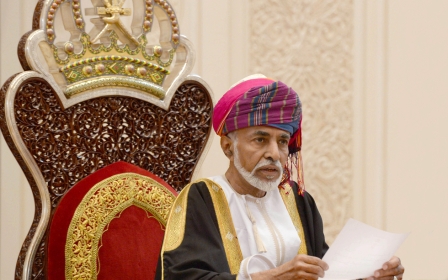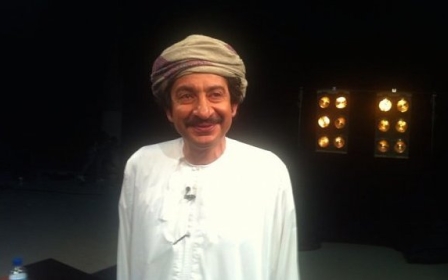Omani editor arrested amid media crackdown: Reports

The editor of one of Oman’s most popular opposition newspaper has been arrested and faces two years in prison for criticising the Gulf Arab sultanate’s government and judicial system, it has emerged.
Prominent journalist Ibrahim al-Maamari, who is editor-in-chief of the Azamn newspaper, was arrested last month after he published an article entitled “Supreme bodies tie the hands of justice”, which referred to allegation of corruption among senior government officials.
Maamari, who was imprisoned in 2011 for criticising Omani ministers during the Arab Spring, faced charges under Oman’s press laws as well as charges of “undermining the prestige of the state” and could face up to two years in prison, the Gulf Centre for Human Rights (GCHR) claimed. His article reported on how senior officials had pressured the judiciary in a case involving a large inheritance.
“We condemn Ibrahim al-Maamari’s arrest and continuing detention,” said Alexandra El Khazen, the head of Reporters Without Border’s Middle East desk. “By punishing this journalist in this way and by keeping him in detention, the Sultanate of Oman is sending a negative message about media freedom and is demonstrating an inability to tolerate criticism of the political and judicial system. We call for an independent and impartial investigation and for al-Maamari’s immediate release.”
Azamn wanted to run a story about his case on its front page on Monday but the Omani Information Ministry blocked its publication and the paper instead blanked out half its front page in protest. A source close to the newspaper reportedly told Reporters Without Borders that Maamari has not been allowed to receive visits or communicate with anyone at the newspaper.
A spokesperson for GCHR, which first highlighted the case, said the group had “serious concerns about the acts of threats, intimidation and surveillance directed at human rights defenders, journalists and internet activists in Oman.”
This is not the first time that the authorities have targeted Maamari. He served five months in prison in 2011 for insulting the justice minister and undersecretary by accusing them of deception and fraud.
That sentence came against the backdrop of the widespread protests in 2011 and saw the paper’s publication suspended for a month, while a justice ministry employee was imprisoned for feeding information to the title.
Maamari’s latest arrest was described by GCHR on Tuesday as a “serious blow to press freedom” in Oman and comes after the arrest of journalist and activist Sulaiman al-Ma’mari in April. According to Amnesty International Ma’mari had been held without trial or access to a lawyer since then.
His arrest came after he joined other writers calling for the release of friend and colleague Abdullah Habib, a poet and film critic who was arrested on 15 April after making peaceful comments on Facebook. Abdullah Habib was released without charge on 4 May.
In May, Amnesty International warned that Oman was increasingly imposing “arbitrary restrictions” on peaceful opponents of the government, including journalists, writers and activists. It said that many had been arrested and detained under “vaguely worded” provisions that criminalise insulting the Sultan.
Oman, a usually tranquil Gulf Arab sultanate, avoided much of the bloodshed of the Arab Spring but was touched by street protests amid calls for higher wages, fairer access to government jobs and an end to corruption.
To placate his people, Sultan Qaboos bin Said, a US ally who has ruled the small, non-OPEC oil-producing state for 46 years, promised a $2.6bn spending package and the creation of 50,000 public sector jobs.
Middle East Eye contacted the Omani embassy in London, but was told nobody in London or the Interior Ministry in Muscat was available for comment.
Middle East Eye propose une couverture et une analyse indépendantes et incomparables du Moyen-Orient, de l’Afrique du Nord et d’autres régions du monde. Pour en savoir plus sur la reprise de ce contenu et les frais qui s’appliquent, veuillez remplir ce formulaire [en anglais]. Pour en savoir plus sur MEE, cliquez ici [en anglais].




